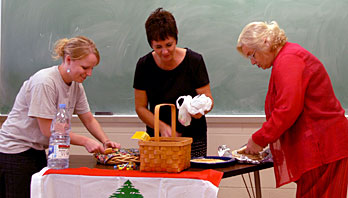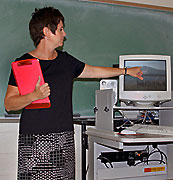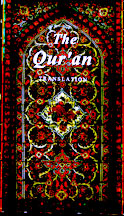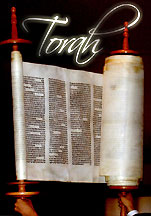
From L-R, Lora Dean, a member of the Arabic Club at Missouri Southern State University, joins Trish Udell and Carolyn Hale, professor of communications, in setting out pita bread and hommus (ArabNet spelling) as an appetizer for the talk given by Udell that followed about her firsthand experience with Hezbollah in wartime Lebanon.
Soufien Jarraya of Tunisia, an instructor of Arabic at Missouri Southern State Unviersity, was the lone Muslim in the audience when guest speaker Trish Udell of Carl Junction talked about her experiences as a missionary in war torn Lebanon. In spite of the posters scattered about the campus advertising in big bold letters, "Free Lunch!," only a handful of students partook of the four pizzas and beverages that were provided for their benefit by Travis Morgan, president of the Arabic Club.
What brought Udell to Lebanon was her participation in what she described as a relief effort by a group of devoted followers of Jesus to help remove debris caused by the Israeli bombing of homes that Hezbollah had occupied. The group also consisted of a dentist, a firefighter and several college students. All had to have experience abroad.
While many of her friends in the States tried to convince her of the dangers involved, Udell said she was undeterred. "We're all about risky," she said before enumerating the number of documents she had to sign securing health and air lift insurance and spelling out the possibility of being held hostage. And she said, as a woman one had to follow local customs: no driving, wearing black outside, covering one's head and carrying a marriage license. Advertising that one was an American was not suggested; Ameicans visiting a bazaar in a group was not advised nor was hiking in areas where undetonated cluster bombs existed.
"You could live in Oklahoma City, OK, and a bomb could go off," Udell remarked, justifying the trip she took by van from Beirut to Tyre to Sidon. Udell was not a novice to life in the Middle East having lived in Saudi Arabia in the early 90s when her husband was a hospital employee there.
 Pointing to one of several pictures she brought, Udell asked the audience what came to mind in thinking of Lebanon. Was it a sunny seascape? A snow-topped Mt Hermon? A plate of fresh fruit or Baba Ghanoush? The pictures she flashed on the screen of the southern portion of bombed-out Lebanon were in startling contrast.
Pointing to one of several pictures she brought, Udell asked the audience what came to mind in thinking of Lebanon. Was it a sunny seascape? A snow-topped Mt Hermon? A plate of fresh fruit or Baba Ghanoush? The pictures she flashed on the screen of the southern portion of bombed-out Lebanon were in startling contrast.
What Udell also found striking was the contrast of culture in the Christian, Moslem and Druze sections. In the Christian section "there are lingerie and alcohol billboards that present a distorted viewpoint, Udell commented.
Although admiting she wasn't a military expert, Udell at first seemed to justify the presence of Hezbollah in Lebanon. Even though she said that Hezbollah was created by Iran in response to Israel's invasion, a tool in the hands of the Syrian regime and for Iran's regional ambitions, she justified their presence.
"In America there's a negative connotation of Hezbollah and the need to forget this, Udell said. "They do a lot of good helping people. They're not as scary as what America thinks...not that I think of them as Boy Scouts..just as helping people." Without government support for repairing the damaged houses, she said that Hezbollah was able to step in. Apparently her group's visit to the regional Hezbollah leader's home affirmed this despite their careful approach to the man.
"You have a beautiful country," they said to the Hezbollah leader, who made clear his power in the region. They reaffirmed that they weren't there to talk politics but, besides, not all of them believed in what America does.
Her defense of Hezbollah, in spite of her comment that she "was completely neutral" and that she would help out in Israel as well, drew some Israel-bashing from the audience. One student enumerated on his belief that the current US administration was "obsessed with the blind following of Israel."
Apparently, appealing to Udell's Christian sensitivity, Jarraya found the need to comment about what he called Israel's "destruction" of Bethlehem's Church of the Nativity and its occurence "without cause." It wasn't clear where Jarraya got his information. Apparently, he was not privy to a newly released book contributed by Eiman Abu Eita, a Fatah official who directed one of the terrorist organizations occupying the Christian holy site. Israel did lay siege to the church for 39 days after the 2002 storming of the church by Muslim terrorists. The occupation he says, was pre-orchestrated by Yasser Arafat's Palestinian Authority in a "conspiracy" to provoke the siege.
"War breeds hatred on both sides," Udell admitted. What she didn't say was that having pre-conceived notions was counter-productive to peace. She did admit that "something powerful happens when people eat together."
Members of the United Hebrew Congregation and Joplin Islamic Center join for dinner


The Qur'an is the word of God revealed to mankind through the last prophet, Muhammad. The Torah is a scroll of parchment containing the first five books of Moses: Genesis, Exodus, Leviticus, Numbers and Deuteronomy. In its broadest sense it can refer to the whole body of Jewish law and teachings. (Photo on right thanks to www.digging with darren.com)
And break bread together was what a group of Jews and Muslims did on September 29 at the Islamic Center in Joplin. Everyone came together for Iftar, the traditional break fast meal, and for the benefit of their guests, all the food adhered to kosher dietary laws.
"The Muslim community extended the invitation to members of the United Hebrew Congregation as a special gesture of friendship," JHC's liaison Joy Dworkin said. "In part this was inspired by the overlapping of our special holidays this year." The month of Ramadan for the Muslims and Rosh Hashanah for the Jews began simultaneously.
Every day of Ramadan Muslims fast during the daytime and eat only when the sun is down. This is in contrast to fasting by the Jews on Yom Kippur or the Day of Atonement that concludes at sundown with much festivity.
Fasting ended at 7:05 that night. Everyone shared in the traditional break-fast eating of dates with some having been lucky enough to be offered dates shipped from the Middle East.
In addition to sharing food, the guests were invited to the Muslim prayer hall. Everyone removed their shoes in compliance with Muslim tradition. The Muslim men assumed their praying posture led by the muezzin or prayer leader with the guests standing a distance behind them.
Separated from them both were the women. After the Muslim prayers concluded, Dr. Paul Teverow conducted a prayer for all the Jewish congregants signifying the end of the Sabbath.
While the men came into the dining hall where the food had been laid out and the women gathered, they took their plates to a separate dining hall to eat. While both the female and male guests were encouraged to enter the food line, most of the Muslim women waited until their husbands had filled their plates. A few exceptions were noted including that of a Muslim woman who said she was a doctor from Monett. In comparison to most women in the room, she was quite outspoken. Shamshinur Silverberg explained that abject poverty amongst many of the Muslims brought them closer to Allah and the traditions spelled out in the Qur'an.
Most of the philosophizing was carried out by the men. Reportedly an animated discussion took place comparing the similarities between the Jewish religion and the religion of Islam.
Both sides agreed that without peace mankind cannot survive. With this kind of interaction they hope that they'll eventually get to know each other and that they are both interested in peace and love. The overriding lesson the Muslims hoped to convey is that Islam has nothing to do with terrorism.
Editor's notes: If you don't ascribe to the old cliche, "Every man's vice is another man's virtue," then you might believe the advice that reached our e-mail that has flooded the Internet under the name "S.A. Rehman, a peace activist" from Pakistan.
Although the advice is offered to fellow Muslims, it could pertain to anyone. "Rehman" warns that "it is not enough to be good; one must also show the right path to others who might otherwise do evil."
Read his full advice column here.
In 1968 a Pakistani named Dr. Sheikh Abdur Rahman, according to Wikipedia had a short stint as the 5th chief justice of Pakistan. He is said to have written at least three books including an Urdu translation of poetry, a collection of Urdu poems and a treatise on the subject of punishment of apostasy in Islam. We have yet to receive confirmation that the two are one in the same.
Presumably, S.A. Rehman's advice is offered to Muslims who do not interpret the Qur'an the same way that those wanting to destroy Western civilization do.






Comments